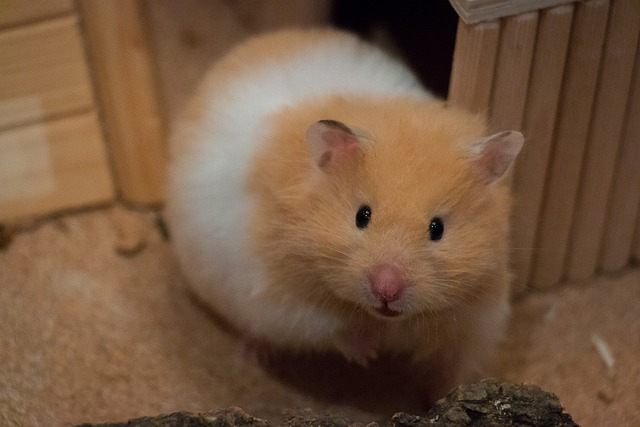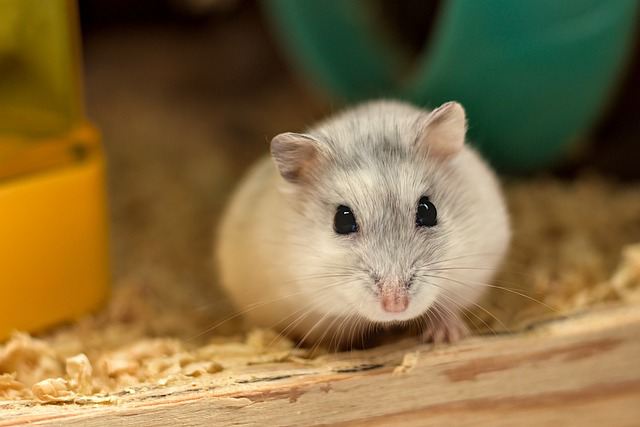9 Factors Affecting Hamster Lifespan & Tips

If you’re thinking about welcoming a furry friend into your home, then you’ve probably considered getting a hamster. But here’s the thing: Have you ever wondered how long these adorable little critters actually live?
Well, you’re in luck! In this blog post, we’re going to dive deep into the fascinating world of hamster lifespans, so grab a cup of tea, sit back, and let’s explore together!
Average Hamster Lifespan
The average lifespan of a hamster typically ranges between 2 to 3 years or more, depending on the species and individual care. Syrian hamsters, also known as golden hamsters, tend to have a longer lifespan compared to dwarf hamsters.
Factors that can influence a hamster’s lifespan include genetics, diet, exercise, and overall health. Providing a proper diet, a clean and spacious living environment, and regular veterinary care can help maximize a hamster’s lifespan.
Average Lifespan of Popular Hamster Breeds

Hamsters are popular pets worldwide, and there are several different breeds to choose from. The average lifespans of different hamster breeds can vary, so let’s discuss the average lifespans of the most popular hamster breeds:
1. Syrian Hamster (Golden Hamster):
The Syrian hamster is one of the most popular hamster breeds. They have an average lifespan of around 2 to 3 years, although some individuals can live up to 4 years with proper care. Syrian hamsters are solitary animals and should be housed alone to avoid aggression.
2. Roborovski Hamster:
The Roborovski hamster is the smallest and fastest hamster breed. They have an average lifespan of about 3 to 3.5 years. Roborovski hamsters are highly active and social animals, so providing them with plenty of exercise opportunities and social interaction is important for their well-being.
3. Dwarf Campbell’s Russian Hamster:
Dwarf Campbell’s Russian hamsters typically live for about 2 to 2.5 years on average. They are social animals and can be kept in same-sex pairs or small groups. Providing them with a suitable habitat and a balanced diet is crucial for their overall health and longevity.
4. Dwarf Winter White Russian Hamster:
The Dwarf Winter White Russian hamster has a similar lifespan to the Dwarf Campbell’s Russian hamster, averaging around 2 to 2.5 years. These hamsters are known for their ability to change their fur color according to the seasons, and they are also social animals that can be kept in pairs or small groups.
5. Chinese Hamster:
The Chinese hamster has a slightly longer average lifespan compared to other hamster breeds, ranging from 2.5 to 3.5 years. They are known for their long, slender bodies and are generally more active during the evening and nighttime hours.
It’s important to note that these are average lifespans, and individual hamsters may live shorter or longer lives depending on various factors such as genetics, diet, living conditions, and overall care.
Factors that Affect Hamster Lifespan

The following are some common factors that affect hamster lifespan:
1. Diet and Nutrition: A hamster’s diet is a cornerstone of its well-being. Opting for high-quality hamster pellets that are nutritionally balanced is crucial. Fresh vegetables and occasional fruits provide essential vitamins and minerals. However, avoid overfeeding, as obesity can lead to health problems that shorten their lifespan.
2. Housing and Environment: The living environment profoundly impacts a hamster’s lifespan. A spacious cage with proper ventilation prevents respiratory issues. Multi-level cages with hiding spots and tunnels mimic their natural habitat, reducing stress and promoting activity.
3. Breed and Species: Different species and breeds of hamsters have varying lifespans. Syrian hamsters, also known as golden hamsters, tend to have longer lifespans compared to dwarf hamsters like Roborovski or Campbell’s hamsters. Understanding the specific characteristics of your hamster’s breed helps you provide appropriate care to support their longevity.
4. Genetics: Genetics plays a significant role in a hamster’s lifespan. Just as certain traits are inherited in humans, hamsters can inherit predispositions to various health issues. Breeds like the Chinese hamster are known for their longer lifespans, while others, like the Syrian hamster, tend to live shorter lives due to their genetic makeup.
5. Stress Levels: Hamsters are sensitive creatures that can experience stress from various sources. Sudden changes in their environment, exposure to loud noises, and overcrowded cages can lead to stress-related health problems. Minimizing stress through a stable and calm environment contributes to a longer and healthier life.
6. Hygiene and Cleanliness: Maintaining a clean and hygienic habitat is crucial for preventing infections and diseases. Regularly cleaning the cage, changing bedding, and ensuring proper ventilation helps keep your hamster healthy. Dirty living conditions can lead to respiratory issues and other health complications that may shorten their lifespan.
7. Veterinary Care: Regular visits to a veterinarian who specializes in small animals are essential for hamster health. Routine check-ups can detect potential health issues early on, allowing for timely treatment. Dental care, in particular, is crucial, as overgrown teeth can lead to significant health problems that may impact their lifespan.
8. Environmental Temperature: Hamsters are sensitive to temperature fluctuations. Keeping them in a consistent environment with a temperature range between 65-75°F (18-24°C) is ideal. Avoid placing their cage in direct sunlight or drafts, as extreme temperatures can cause stress and health problems.
9. Exercise and Enrichment: Hamsters are naturally active creatures that need regular physical and mental stimulation. Providing an exercise wheel, tunnels, platforms, and toys encourages them to explore and stay active. Physical activity not only keeps them fit but also helps prevent obesity-related health issues that can shorten their lifespan.
Hamster Aging Process
The aging process in hamsters is relatively fast compared to humans. On average, hamsters live for about 2 to 3 years. As they age, their fur may become thinner and their activity levels may decrease.
Hamsters may also experience dental problems and have a higher risk of developing diseases such as tumors and arthritis.
Providing a proper diet, regular veterinary check-ups, and a clean and comfortable living environment can help ensure a healthy and comfortable aging process for hamsters.
How to Improve Your Hamster’s Lifespan

Improving your hamster’s lifespan requires proper care, a healthy diet, and a suitable environment. Here are some common ways to increase your hamster’s lifespan:
1. Provide a Proper Habitat: Ensure your hamster has a spacious and comfortable cage with sufficient ventilation, bedding, and hiding places. Avoid keeping hamsters in small enclosures or aquariums without proper ventilation.
2. Balanced Diet: Feed your hamster a well-balanced diet consisting of fresh vegetables, fruits, high-quality hamster pellets, and occasional treats. Avoid feeding them sugary or fatty foods, as these can lead to obesity and health issues.
3. Clean Water: Provide fresh, clean water to your hamster daily. Change the water regularly to prevent bacterial growth.
4. Exercise and Enrichment: Hamsters are active animals and need regular exercise. Provide them with a hamster wheel, tunnels, and toys to keep them mentally and physically stimulated.
5. Regular Veterinary Check-ups: Schedule regular check-ups with a veterinarian who specializes in small animals. They can detect any health issues early on and provide appropriate treatment.
6. Proper Handling: Handle your hamster gently and avoid dropping or mishandling them. Stress and injuries can affect their overall health and lifespan.
7. Clean and Safe Environment: Regularly clean the hamster’s cage, removing any soiled bedding or waste. Keep the environment free from hazards, such as sharp objects or toxic substances.
8. Avoid Overbreeding: Overbreeding can lead to health problems in hamsters. If you plan to breed them, ensure you have the proper knowledge and resources to handle the process responsibly.
9. Social Interaction: Hamsters are social animals and can benefit from regular social interaction with their owners. Spend time with your hamster, handling them gently, and providing opportunities for play and bonding.
Remember, each hamster is unique, and their lifespan can vary depending on factors such as breed, genetics, and overall health. By following these guidelines, you can provide the best care for your hamster and increase their chances of living a long and healthy life.
Illnesses that can affect hamster lifespan
Hamsters are susceptible to various illnesses that can significantly impact their lifespan. Here are some illnesses that can affect hamster lifespan:
- Respiratory Infections: Hamsters are prone to respiratory infections, which can be caused by bacteria, viruses, or environmental factors. Symptoms include sneezing, coughing, difficulty breathing, and nasal discharge. If left untreated, respiratory infections can be life-threatening for hamsters.
- Wet Tail Disease: Wet tail is a highly contagious bacterial infection that primarily affects young hamsters. It is characterized by watery diarrhea, a wet and soiled tail area, lethargy, and loss of appetite. Wet tail can be fatal if not promptly treated with antibiotics and supportive care.
- Tumors: Hamsters can develop various types of tumors, including both benign and malignant growths. Tumors can affect different organs and tissues, such as the mammary glands, reproductive system, or internal organs. Depending on the type and location, tumors can significantly impact a hamster’s lifespan.
- Diabetes: Hamsters can develop diabetes, a metabolic disorder characterized by high blood sugar levels. Symptoms may include increased thirst, frequent urination, weight loss, and decreased activity. Diabetes can lead to complications and a shortened lifespan if not properly managed with diet, medication, and veterinary care.
- Dental Problems: Hamsters have continuously growing teeth, and dental issues can arise if their teeth become overgrown or misaligned. Common dental problems in hamsters include malocclusion (misalignment of the teeth), abscesses, and tooth root infections. These conditions can cause pain, difficulty eating, and weight loss, ultimately affecting the hamster’s overall health and lifespan.
- Cancer: Like humans and other animals, hamsters can develop cancer. Different types of cancer can affect various organs and tissues in hamsters, including lymphoma, mammary tumors, and skin tumors. The prognosis and impact on lifespan depend on the type and stage of cancer, as well as the effectiveness of treatment options.
What do Hamsters usually die from?
Hamsters can die from various causes, but the most common ones include old age, health problems, stress, and accidents. As hamsters age, their bodies become more susceptible to age-related illnesses and organ failure, leading to their demise.
Health problems such as respiratory infections, tumors, and digestive issues can also be fatal for hamsters if left untreated. Stress can weaken hamsters immune systems, making them more vulnerable to illnesses.
Accidents, such as falls or getting caught in cage equipment, can result in severe injuries or even death for hamsters.
Related Questions
Can the lifespan of a hamster be extended?
While it’s challenging to extend a hamster’s natural lifespan, certain measures can promote their overall health and well-being. Ensuring a nutritious diet, a stimulating environment and regular exercise can contribute to a longer and healthier life for your furry friend.
Are there any specific health issues that can affect a hamster’s lifespan?
Yes, hamsters can be prone to certain health issues that may affect their lifespan. These include dental problems, respiratory infections, tumors, and obesity. Regular vet check-ups and a watchful eye for any signs of illness can help identify and address these issues promptly.
How can I ensure my hamster lives a long and healthy life?
To promote a long and healthy life for your hamster, provide a well-balanced diet consisting of fresh vegetables, fruits, and high-quality hamster food. Ensure they have a spacious and clean habitat with plenty of opportunities for exercise and mental stimulation. Regularly clean their cage and provide fresh water. Additionally, spend time bonding with your hamster to strengthen your relationship and monitor their health closely.
What are some signs that my hamster’s lifespan may be coming to an end?
As hamsters age, they may show signs of decreased activity, weight loss, changes in appetite, and difficulty moving. They may also become more lethargic and spend more time sleeping. If you notice any of these signs, it’s essential to consult with a veterinarian to ensure your hamster receives appropriate care and support during this stage of their life.
Learn more about caring for your hamster.
Conclusion
In conclusion, when it comes to the lifespan of our adorable furry friends, hamsters, it’s important to keep in mind that they may only be with us for a few short years. However, those years are packed with endless joy, love, and memories.
So let’s make the most of every precious moment we have with our hamster companions, showering them with affection, care, and the happiest little hamster lives imaginable!
